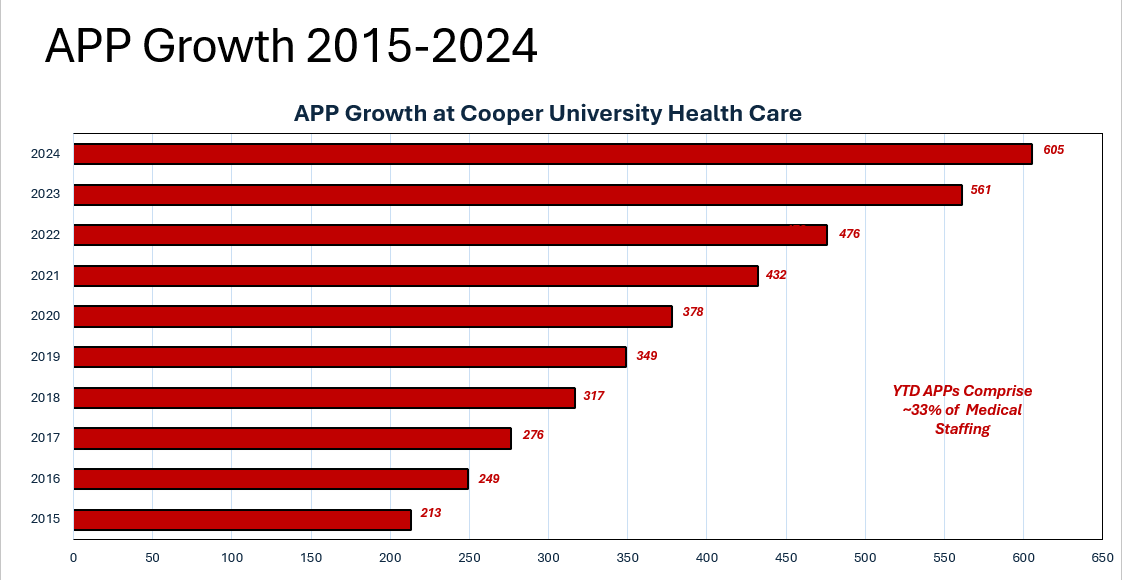Introduction
In 2023, Cooper University Health Care became the first hospital in New Jersey, and part of a small, select group of academic medical centers in the nation, to launch a Center for Advanced Practice (CAP) to promote and support the role of advanced practice professional in the health care continuum.
Advanced practice providers (APPs) are licensed health care professionals who work collaboratively with physicians and the care team. They comprise physician assistants/associates, nurse practitioners, certified registered nurse anesthetists, clinical nurse specialists, and certified nurse midwives. APPs are prepared through advanced education, clinical training, and licensing and board certification to provide a wide range of preventive, acute, and chronic health care services to individuals of all ages.
“Advanced practice professionals are an integral part of the health care team at Cooper, and more than 500 APPs currently practice in numerous specialties across the health system, providing nearly 230,000 patient visits this year alone,” says Eileen F. Campbell, MSN, APN, Chief Advanced Practice Professional, who leads the new center. “Cooper’s Center for Advanced Practice not only provides a coordinated platform to support our current APPs through professional development and other initiatives, but will also enhance recruitment and retention efforts, improve quality, and help standardize and expand access to care, which ultimately benefits patients.”
As the population ages and consumer demands for high-quality health care grow, the role of APPs has expanded across the health care spectrum – in medical practices, hospitals, surgery centers, retail clinics, and urgent care centers across the country.
“We are proud of the incredible contributions made by our APPS, who work within nearly every department at Cooper,” says Eric Kupersmith, MD, SFHM, Chief Physician Executive at Cooper. “Evidence has clearly shown that this growing work force helps organizations drive improvement in quality, safety, and efficiency, resulting in better outcomes and higher patient experience. By working collaboratively with physicians and other team members, patients are provided better access to care and continuity, demonstrating outstanding results.”
“Cooper’s CAP also provides valuable support to our registered nurses who desire to expand their knowledge and clinical scope of practice through professional development and advanced studies to become APPs,” says Kathy Devine, DrNP, NEA-BC, Senior Vice President and Chief Nursing Executive at Cooper. “Our current APPs will serve as mentors and provide guidance and leadership for newly licensed practitioners and those pursuing new careers.”
Cooper provides a wide range of professional development programs, including an annual symposium, for all APPs in the region.
Charter
The Center for Advanced Practice will provide an organizational platform to enhance recruitment and retention in the tristate area and drive high priority objectives and optimal utilization and integration of Advanced Practice Providers (APPs) to drive access, growth, quality, experience and network integrity, making Cooper the best place to work and the desired destination for Advanced Practice Providers.
Leadership
Eileen Campbell, MSN, APN, Chief Advanced Practice Provider
Shaun Rowe, PA-C, MBA, Co-Director, Center for Advanced Practice
Katarzyna A. Andruchow, MSN, APN, Co-Director, Center for Advanced Practice
Ashley Weinmann, DNP, MBA, APN, Chair, AP Council
Please visit our careers page for new job opportunities.

Have question about the Center for Advanced Practice, please email: Center-for-Advanced-Practice@cooperhealth.edu
